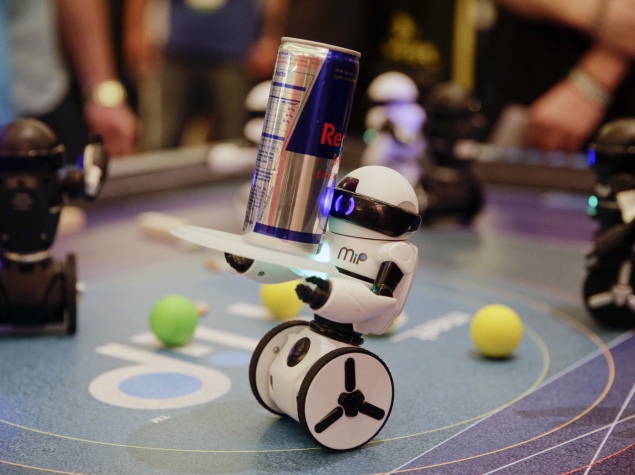- Home
- Science
- Science Features
- Robots to Up End the World of Work, for Good and Bad
Robots to Up-End the World of Work, for Good and Bad

The Pew Research Center said experts see a growing role for self-driving cars, delivery drones, robotic workers, smartphone-based assistants and even algorithmic journalism by 2025.
But they are divided on whether these technological advances will be helpful, with 48 percent of respondents to Pew's survey saying they will destroy jobs and increase income inequality.
Nevertheless, a slim majority said the technology will take over undesirable tasks and generate new kinds of human employment.
The report is not based on a randomized poll sample, but instead on an opt-in survey of people deemed experts or affiliated with certain organizations, taken between November 2013 and January 2014.
Lee Rainie, director of the Pew Research Internet Project, said experts see "the accelerating displacement of work that can be done more efficiently and cost-effectively" by robots.
This means "a transformation of labor, especially in the fields of transportation, fast food and medicine; freedom from day-to-day drudgery that allows people to define work in a more positive and socially beneficial way."
But Rainie said many see this as leading to "a shrinking of the middle class and expansion of the ranks of the unemployed."
'Automation is Voldemort'
"Automation is (the 'Harry Potter' villain) Voldemort: the terrifying force nobody is willing to name," said Jerry Michalski, founder of Relationship Economy eXpedition, a think tank of corporate executives.
"The race between automation and human work is won by automation, and as long as we need fiat currency to pay the rent/mortgage humans will fall out of the system in droves as this shift takes place."
Stowe Boyd, lead researcher at GigaOM Research, said the growing use of autonomous vehicles will take away important jobs for men such as truck and taxi drivers.
"An increasing proportion of the world's population will be outside of the world of work either living on the dole, or benefiting from the dramatically decreased costs of goods to eke out a subsistence lifestyle," he said.
"The central question of 2025 will be: What are people for in a world that does not need their labor, and where only a minority are needed to guide the 'bot-based economy?'"
Justin Reich at Harvard University's Berkman Center for Internet & Society, said, robots and artificial intelligence "will increasingly replace routine kinds of work even the complex routines performed by artisans, factory workers, lawyers, and accountants."
Others were optimistic such as JP Rangaswami, chief scientist for Salesforce.com.
"The very nature of work will have changed radically by 2025, but only in economies that have chosen to invest in education, technology and related infrastructure," he said.
"Some classes of jobs will be handed over to the 'immigrants' of AI and robotics, but more will have been generated in creative and curating activities as demand for their services grows exponentially."
Vint Cerf, chief Internet evangelist for Google, said: "Historically, technology has created more jobs than it destroys and there is no reason to think otherwise in this case. Someone has to make and service all these advanced devices."
The report is based on views from nearly 1,900 respondents selected by Pew because of their background.
They were affiliated to think tanks; companies including Cisco Systems, British Telecom and Microsoft; universities such as the Massachusetts Institute of Technology; news organizations and activist groups such as the Electronic Privacy Information Center.
Get your daily dose of tech news, reviews, and insights, in under 80 characters on Gadgets 360 Turbo. Connect with fellow tech lovers on our Forum. Follow us on X, Facebook, WhatsApp, Threads and Google News for instant updates. Catch all the action on our YouTube channel.
Related Stories
- Samsung Galaxy Unpacked 2026
- iPhone 17 Pro Max
- ChatGPT
- iOS 26
- Laptop Under 50000
- Smartwatch Under 10000
- Apple Vision Pro
- Oneplus 12
- OnePlus Nord CE 3 Lite 5G
- iPhone 13
- Xiaomi 14 Pro
- Oppo Find N3
- Tecno Spark Go (2023)
- Realme V30
- Best Phones Under 25000
- Samsung Galaxy S24 Series
- Cryptocurrency
- iQoo 12
- Samsung Galaxy S24 Ultra
- Giottus
- Samsung Galaxy Z Flip 5
- Apple 'Scary Fast'
- Housefull 5
- GoPro Hero 12 Black Review
- Invincible Season 2
- JioGlass
- HD Ready TV
- Latest Mobile Phones
- Compare Phones
- Tecno Pova Curve 2 5G
- Lava Yuva Star 3
- Honor X6d
- OPPO K14x 5G
- Samsung Galaxy F70e 5G
- iQOO 15 Ultra
- OPPO A6v 5G
- OPPO A6i+ 5G
- Asus Vivobook 16 (M1605NAQ)
- Asus Vivobook 15 (2026)
- Brave Ark 2-in-1
- Black Shark Gaming Tablet
- boAt Chrome Iris
- HMD Watch P1
- Haier H5E Series
- Acerpure Nitro Z Series 100-inch QLED TV
- Asus ROG Ally
- Nintendo Switch Lite
- Haier 1.6 Ton 5 Star Inverter Split AC (HSU19G-MZAID5BN-INV)
- Haier 1.6 Ton 5 Star Inverter Split AC (HSU19G-MZAIM5BN-INV)






![[Partner Content] OPPO Reno15 Series: AI Portrait Camera, Popout and First Compact Reno](https://www.gadgets360.com/static/mobile/images/spacer.png)









